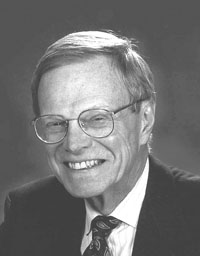The Equations (of Change) Don't Change, But the Profession of Engineering Does
Inaugural Lecture by William R. Schowalter
Emeritus Professor
Tuesday, October 2, 2001
Room 1800 Engineering Hall
Lecture at 1:00 p.m.
In Honor of Three Eminent Chemical Engineers and Educators
Reception and book signing by the authors of Transport Phenomena at 12:30 p.m. in the Engineering Hall lobby.
Engineering, by its very definition, is focused on solving problems, thereby constantly altering the arena in which engineering is practiced. That poses a challenge for engineering educators. The impact of such changes on chemical engineering during the four decades since the appearance of the first edition of Transport Phenomena by Bird, Stewart and Lightfoot have greatly expanded the scope of our profession. I shall present some observations and opinions about the consequences of this expansion for engineering educators. I believe our opportunities and obligations are rather different at the undergraduate, the graduate, and the professional levels of education, and these will be described. Also, the nature of U.S. universities is changing, and this too must be recognized as we look forward.
 |
William R. Schowalter is Emeritus Professor of Chemical Engineering and former Dean of Engineering at the University of Illinois at Urbana-Champaign. He received his B.S. from the University of Wisconsin Department of Chemical Engineering in 1951. Following receipt of his Ph.D. from the University of Illinois in 1957, he joined Princeton University, where he became chairman of the Department of Chemical Engineering in 1978 and was appointed as the Class of 1950 Professor of Engineering and Applied Science in 1986. In 1989, Professor Schowalter returned to Illinois as Dean of the College of Engineering where he served until his retirement in 2001. He received the Walker Award of the American Institute of Chemical Engineers in 1982, a Guggenheim Fellowship during 1987-88, and the Bingham Medal of the Society of Rheology in 1988. He is a member of the National Academy of Engineering and the National Academy of Sciences, and is a Fellow of the American Academy of Arts and Sciences. Professor Schowalter's research involves the mechanics of complex fluids: fluids composed of large molecules, deformable particles, or colloidal matter for which the laws of conventional continuum fluid mechanics do not apply. By modeling multiphase behavior and the effects of flow on long-range structure in suspensions and emulsions, he has shown that systems in which particulates are initially randomly dispersed can evolve under shear into ordered materials, with important consequences for anisotropic properties relating to strength, heat transfer, or electrical conductivity.
